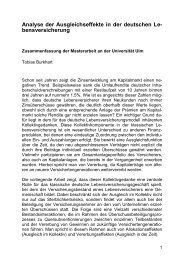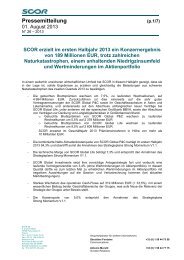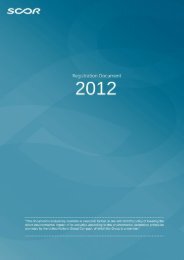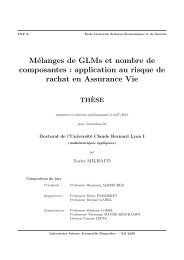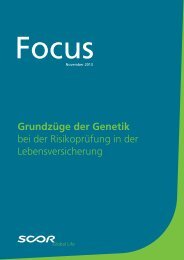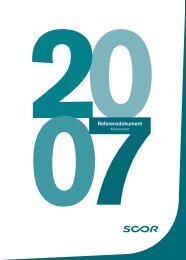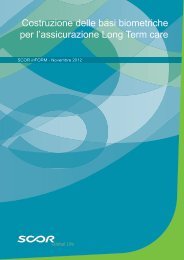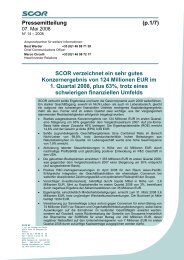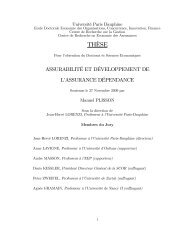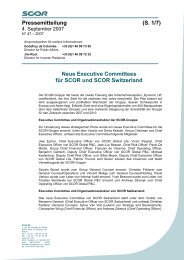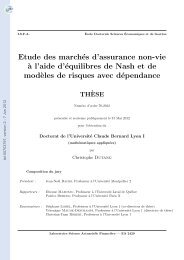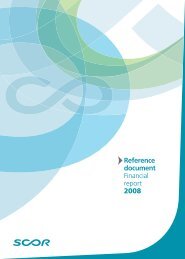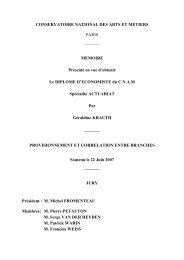Bancassurance and its status around the world - Scor
Bancassurance and its status around the world - Scor
Bancassurance and its status around the world - Scor
Create successful ePaper yourself
Turn your PDF publications into a flip-book with our unique Google optimized e-Paper software.
Indeed, advisers sometimes need to hold a special<br />
qualification to be able to sell insurance policies.<br />
For example, in France, you have to hold a national<br />
diploma awarded after a minimum of 135 hours of<br />
training, which entitles you to a card required to sell<br />
insurance. “Crédit Agricole has 18,000 cardholders<br />
in <strong>its</strong> 9,000 branches”, boasts Edouard de Bonnafos,<br />
Technical <strong>and</strong> Products Director at Predica.<br />
This is also true in Asia <strong>and</strong> notably in South Korea<br />
where, as well as this diploma, <strong>the</strong> law restricts <strong>the</strong><br />
number of people authorized to sell insurance<br />
policies to two per point of sale. None<strong>the</strong>less,<br />
in bancassurance, <strong>the</strong>re are many special<br />
arrangements: “a banker who sells financial<br />
products must be able to sell insurance policies”,<br />
as Mr Jean-Patrick Simon, Director of SH&C, points<br />
out.<br />
Of course, <strong>the</strong> training pattern varies from one<br />
company to ano<strong>the</strong>r. However, here we propose<br />
to cover <strong>the</strong> main factors common to most<br />
bancassurance operators:<br />
● As a general, training is provided by product<br />
specialists chosen for <strong>the</strong>ir training <strong>and</strong><br />
coaching skills. In addition, <strong>the</strong>y may often<br />
have been involved in designing <strong>the</strong> new<br />
insurance product <strong>the</strong>y are explaining;<br />
● The programmes are ei<strong>the</strong>r aimed at a small<br />
number of people trained at company or<br />
regional headquarters, who will <strong>the</strong>n train <strong>the</strong><br />
branch personnel, or targeted directly at <strong>the</strong><br />
sales force in <strong>the</strong> field;<br />
● As a rule, training focuses specifically on<br />
insurance products. Never<strong>the</strong>less, certain<br />
bancassurance operators prefer to integrate<br />
<strong>the</strong> training sessions with <strong>the</strong>ir partner bank’s<br />
total training programme. At Cardif, for<br />
example, training is not only about <strong>the</strong> product.<br />
For example, part of it will focus on insurance<br />
policies in a course devoted to life insurance<br />
products, partly in order to show how <strong>the</strong>se<br />
policies work, but above all to show how <strong>the</strong>y<br />
complement <strong>the</strong> bank's o<strong>the</strong>r products<br />
(advantages compared with collective<br />
investment vehicles, etc);<br />
16 focus october 2005 <strong>Bancassurance</strong><br />
● In order to achieve better results when<br />
launching new products, courses are<br />
scheduled for <strong>the</strong> weeks before <strong>the</strong>se products<br />
are made commercially available. Never<strong>the</strong>less,<br />
changes to <strong>the</strong> characteristics of existing<br />
products do not necessarily result in a new<br />
training programme.<br />
However, it would be too reductive to restrict<br />
training plans to coincide with <strong>the</strong> launch of<br />
new products. That is why at Altavida Seguros<br />
de Vida, Groupe Sant<strong>and</strong>er’s Chilean subsidiary,<br />
courses are also provided at <strong>the</strong><br />
request of <strong>the</strong> sales force or if regional<br />
managers perceive a need on <strong>the</strong>ir tours of<br />
bank branches;<br />
● In order to give <strong>the</strong> sales force additional<br />
support, certain bancassurance operators<br />
(e.g. BNP Paribas Assurance) have even<br />
developed e-learning systems, which can be<br />
accessed at any time by <strong>the</strong> local network <strong>and</strong><br />
sometimes in foreign subsidiaries.<br />
Remuneration<br />
Distributing <strong>the</strong>se life insurance policies, whe<strong>the</strong>r<br />
through a joint venture or distribution agreements,<br />
has a cost for insurance companies. It is essential to<br />
heighten <strong>the</strong> awareness of sales forces of <strong>the</strong> need<br />
to sell insurance policies. As we have seen, this is<br />
done partly through training, but also by a new<br />
commission policy.<br />
Whe<strong>the</strong>r in bancassurance or traditional networks,<br />
<strong>the</strong> products that are <strong>the</strong> easiest to sell <strong>and</strong> <strong>the</strong> most<br />
profitable for financial advisers, are <strong>the</strong> ones that<br />
have <strong>the</strong> most success. In order to motivate <strong>the</strong><br />
teams to sell insurance products, it is <strong>the</strong>refore<br />
essential to offer <strong>the</strong>m appropriate rewards.<br />
However, rewarding sales forces within <strong>the</strong><br />
framework of a multi-channel distribution process<br />
is not necessarily easy. Who should get <strong>the</strong><br />
commission: <strong>the</strong> network sales personnel, <strong>the</strong><br />
telephone advisers, <strong>the</strong> points of sale? Who can sell<br />
what <strong>and</strong> how do you set targets?<br />
Under <strong>the</strong> Crédit Agricole system, Predica pays<br />
commission to <strong>the</strong> Caisses Régionales du Crédit<br />
Agricole Mutuel (CRCAM) <strong>and</strong> also adds a system



